It’s been a while since I recapped episode eight, and even though I did finish watching the second season of this show, I found myself incredibly reluctant to finally finish recapping it. I couldn’t really say why, I just didn’t want to. But now, having taken some time to think about it, an enforced mental time out that has resulted from the internet in my new apartment not being hooked up yet, I think I know what’s up. Simply, I didn’t want to finish recapping the second season, because I didn’t want the second season to be over.
I am aware that this is weird, crazy magical thinking, but it’s true. I love Orphan Black. It’s legitimately difficult for me to contemplate how much I love it. So much. But it’s not just that Orphan Black is a good show that tells a compelling story, or even that it’s one of the best science fiction stories we’ve seen in years, though both of those are true. It’s really because of how innately satisfying it is to watch a show that is entirely explicitly about women and how they relate to their bodies. How the world relates to their bodies. And the tension between those women and the world.
I’ve said that before, but it really does bear repeating. Orphan Black is exception not in spite of the way it focuses on female reproductive issues or bodily consent or medical terminology, but because of all of those things. It is crucial to our understanding of this show as a work of literature - because let’s be real, it’s a work of literature - that we see how intertwined this show and its stories are with our cultural understanding of who owns women’s bodies.
And with that, let’s get into the episode. What happened?
As you hopefully recall from the previous episode (though I’ll forgive it if you don’t, because I recapped that literally months ago), we left on one of the most shocking events of the series to date: Leekie’s accidental murder, courtesy of Donnie freaking Hendrix. If you don’t remember why this was stupidly surprising, you should probably just go back and rewatch the whole series. I’ll wait. Donnie had taken some time to deal and managed to confess his crime to Alison, who reacted not with horror that her husband committed murder, but disgust that he did such a bad job at it. Because Alison is terrifying.
Anyway, we come back to Alison and Donnie dealing with the body and cleaning up the scene of the crime (Donnie’s car). Alison is completely matter of fact about the entire thing, again, frustrated not because there’s a dead body, but because Donnie didn’t properly cover him in a tarp and she had to clean the interior carpet of the car.
What we get is a fantastic montage of Donnie and Alison rolling the body up in a plastic shower curtain, shoving it into the freezer in the garage, and trying to figure out how to permanently dispose of this whole thing. It’s probably the most function we’ve ever seen them in their marriage, and that tickles me.
The transition here is jarring, going from the virtual screwball comedy that is Donnie and Alison, to the dark, intense dystopian nightmare that is Helena’s entire life. We come in on her, having returned to the Prolethean ranch so that they can give her back her “babies” - the eggs that they harvested from her when she was unconscious and then fertilized without her consent. Helena, interestingly, is obsessed with the idea of becoming a mother.
The Proletheans are happy to implant the eggs in Helena (though that’s probably not all they’re going to do with them), and Helena is relatively happy to have them implanted. The consent issues concerning Helena’s body are, for the moment, not rearing their ugly heads. This is her choice. For now.
I will admit, though, that I already miss Helena’s almost boyfriend, Jesse, from that truck stop a few episodes ago. He was cute, and he was totally into Helena even if she seemed utterly bonkers, and I want him to come back. Not important, but I do.
Also worth noting is the actress who plays the nurse in the implantation scene, and later the women in charge of the nursery at the ranch. The woman’s name isn’t important, but the actress is Kathryn Alexandre. The name should be vaguely familiar - she’s the person who plays opposite Tatiana Maslany whenever there’s a multiple clones scene. Maslany credits her as the best person to act against, and from what I can tell Alexandre deserves it. It’s nice to see her get a speaking role, since her usual one, for all that it is completely vital to the survival of the show and all that, is by its nature invisible.
On a different level entirely, Rachel is the kind of threatening, toxic person who makes one uncomfortable even when she’s doing something as simple and non-confrontational as sitting on a couch with Delphine. Delphine, of course, being the human equivalent of a cocker spaniel puppy with a PhD. Rachel’s not just pouring tea, of course, she has a motive to this conversation. She needs Delphine to convince Sarah to bring in Kira for medical testing.
Since Kira is the only known descendent of the clones, and therefore has the only usable bone marrow/stem cells/healthy immune system, it is actually necessary for DYAD to get their hands on Kira’s genetic material in order to stop the immune disorder that’s killing Cosima and everyone else. Blegh. That’s a lot of exposition. Props to the show for making you forget the exposition is there by couching it in a vaguely threatening tea party.
Delphine also understands that if she does this, she will get a hell of a promotion - to Leekie’s old position as head of DYAD’s research division. This is literally what Delphine’s entire career has been leading towards. She wants that freaking job. She’s willing to do a hell of a lot to get that job.
Including, it seems, actually showing up to Mrs. S’ house to talk to Sarah, who we already know scares the crap out of Delphine. She has to make the pitch not just to Sarah, of course, but also to Mrs. S and Ben (the driver dude played by the guy who plays Death on Supernatural). Heck, Kira’s probably listening somewhere too.
The pitch is simple: because it’ll take too long for Duncan to uncode his original DNA sequences, the ones that gave the clones their immune disorder in the first place, it makes more sense to get some bone marrow from Kira and stockpile a cure for the lung disease that’s killing Cosima now, before anyone else dies or anyone else falls sick. Makes sense. But then, it is Rachel who came up with the plan, and one can pretty much guarantee that there’s more behind it than just self-preservation. Or at least there’s more self-preservation than there currently seems.
Sarah, for once, decides not to act unilaterally, and takes the chance after Delphine leaves to catch up with her clone-sisters. Cosima is in rough shape, hooked up to an oxygen tank, and Alison is of course incredibly tightly wound, but they’re all happy to see each other. It’s a really fascinating character development for all of them because, as you may recall from the beginning of the show, none of them was all that interested in being a sisterhood. They were all there to solve the mystery or figure out the science, but not actually for each other.
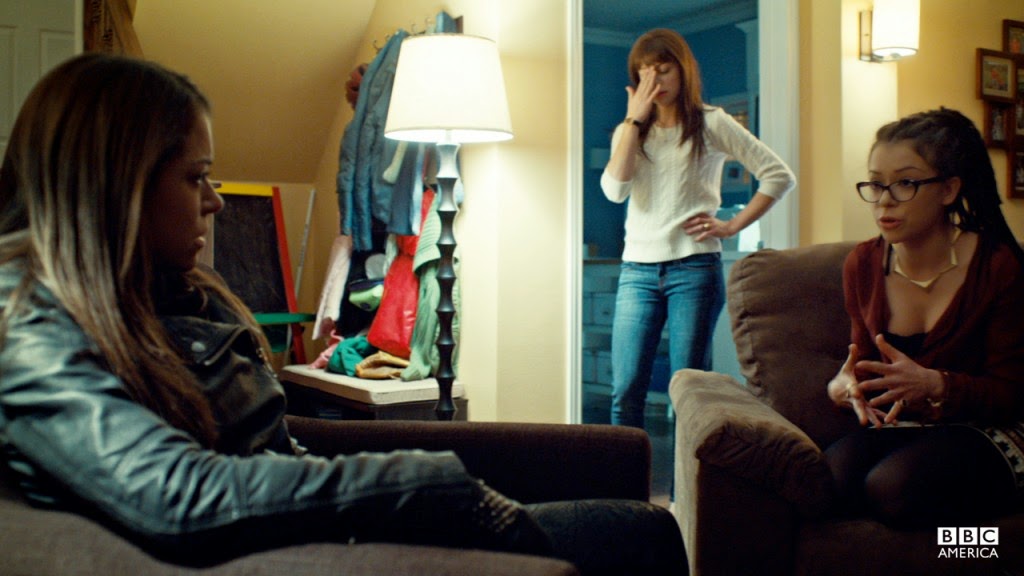 |
| Ages ago in character development. |
Now? Now they’re in it together. They’re a family. And that is perhaps my favorite development on this show. So often when you have a serialized drama like this, you see characters fracturing apart, destroyed by lies or drama or what have you. Here, we see our characters coming further and further into a state of understanding and love for each other. With each passing season they become more unified and devoted to each other and that is just so wonderful.
Guys, take a minute and appreciate Orphan Black. Imagine the world that we might have had if this show weren’t made, and then cry a little in joy that it was.
Cosima and Sarah agree that Kira shouldn’t go into DYAD, but that they do need her help. Alison feels sad that she’s so caught up in her own crap - her marriage and rehab and oh yeah those murders - but the other assure her, in a great moment of solidarity, that her problems matter too. Speaking of which, Alison takes the moment to ask if anything’s been heard about Dr. Leekie?
She gets the party line, that he died of a heart-attack on a private jet, and while everyone understands that it’s a total lie, it seems that no one knows what actually did happen to him, and no one’s looking to find out. They did it. They’re in the clear. They have literally gotten away with murder. For now. As long as no one finds the body.
Donnie thinks they should dump it in the lake, with weights and stuff, but Alison quickly shuts that down. She’s seen Dexter. She knows how easy it is to dredge stuff up. They can’t transport the body, so they’re going to bury it in the garage.
Which brings us to yet another moment where Alison’s children are oblivious to an extent that real children would not be. Like, I appreciate the idea that they’re kids and they’re watching cartoons and stuff so they might not notice the mad vibrations coming from the freaking jackhammer their parents are using the in garage, but, um, no. No.
Great moment, though, when Donnie’s trying to drill a hole with the jackhammer, and can’t really manage it, so Alison takes over and proves, once again, who the dominant personality is in this relationship. Also who is better at murder and coverups. In case we were ever in doubt on that one.
Another tangent, but this entire storyline makes me really wish that Orphan Black was the sort of show to indulge in flashbacks. I mean, I love that it doesn’t, that it demands that you take it as is, but I really want to see some footage of college-age Donnie and Alison, with Alison planning how Donnie will propose to her, and Donnie trying to pretend that it was his own idea, and all that stuff. I want it. I want to see Alison as a Bridezilla, because it would make me so happy.
Back at the (Prolethean) ranch, Helena is recovering from the egg implantation, and that woman from before (the one played by Alexandre), comes to show her around. She takes Helena to the nursery and preschool, where all the Prolethean children are raised communally. She reminds Helena that she’s “part of our family now”, and that Helena can come visit the children whenever she wants. For a child raised in deprivation like Helena’s, and with so little human contact, this must feel frightening and amazing and baffling. But she rallies well, and even makes a few faces at one of the little girls there. Adorable.
Almost cute enough to make you forget how incredibly violent and feral Helena can be. Almost.
The scene is also almost sweet enough to cover over the hideous violence and disturbing lack of personal autonomy that the Proletheans feed on. But the next scene reminds us admirably, as we focus in on Gracie, her mouth still red from being sewn shut, pouring her father and Mark a drink. Gracie doesn’t get her own drink, nor does she get to sit in on the conversation (that likely involves her future). Instead, Gracie pours the drinks and then gets the door literally shut in her face so that the men folk can discuss business. Not that this is a super pointed scene or anything.
For all that, though, this is a very interesting scene. We finally get a hint as to Mark’s backstory - first that he’s only nineteen, which is a lot younger than I thought, and second that he was in the military already, he saw combat, and he went AWOL. Which begs the question, how did a nineteen year old veteran end up a member of a technology cult? I really hope they answer this. It seems important.
Henrik has a point here, at any rate. He knows that Mark and Gracie are sweet on each other, and while he thinks that’s cute, he wants to make sure that Mark will stand by while Gracie “bears fruit”. In other words, yay, Mark and Gracie get to bear children, boo, the condition for that is that Gracie bear children that I have a sneaking suspicion will be a combination of her father’s DNA and that of the clone she literally tried to murder. Awkward.
And, again, a point where the show makes it clear that when men take bodily autonomy from women, it is always wrong. The show doesn’t try to make these men sympathetic, for all that they’re complex (well, Mark is sympathetic, but not Henrik). They are the bad guys.
It also illuminates what I think is going to be the theme of this episode: the terms of our agreement. You know? Delphine can have Leekie’s job, if she convinces Sarah to give up Kira’s bone marrow. Mark can marry Gracie, if he agrees to farm out her uterus. Sarah can save Cosima, if she’s willing to risk her daughter. Helena can have her babies, if she agrees to raise them in the Prolethean way. Alison and Donnie can get away with murder, if they can hide the body. Rachel, of course, has no conditions put on her future or actions, because in this moment, Rachel has all the power.
Undoubtedly that will change.
Back in Toronto, Sarah is torn. On the one hand, she really loves Cosima. Out of all of the clones, and despite Helena’s best efforts, Sarah likes Cosima best. It’s not hard to see why. Cosima is pure in a way that most of them aren’t. She wants to save her sister. But she loves Kira, and she doesn’t want to risk it. Mrs. S is even less fond of the idea of risking it, while Felix, who’s finally in this episode because Felix makes everything better, is undecided. However, as Mrs. S so amazingly points out, it’s not Sarah’s decision, or Felix’s, or hers.
Hell yes, it’s Kira’s decision. For all that Kira is still a child, the show has made it clear that she is capable of making bodily decisions on her own, and they seem determined and happy to emphasize the point. Women should have the right to determine what happens to their bodies, no matter what the stakes. Kira is the one who decides what happens to her body. Not even her mother has the right to take that away from her.
And so we get the heartbreaking scene where Sarah and Mrs. S have to explain the stakes to an eight year old. Admittedly, it’s an eight year old who is written like a four year old because in what seems to be the show’s only flaw, the writers can’t do child dialogue to save their lives, but still. Kira’s afraid of the potential pain involved, but she loves her “Auntie Cosima”, and she wants to save her. So save her she will. Mrs. S and Sarah have a moment of, “How the hell did we raise such a selfless and kind child? Have you met us?”
The procedure itself will happen in a hospital not under DYAD’s control, with a doctor that Mrs. S just happens to know, because of course she does. Delphine is there to supervise, but it’s largely out of her hands now. Still, that doesn’t stop Mrs. S from giving her the death stare, and Felix and Sarah from shutting her out. The message is clear: Delphine is not family, while the rest of them are.
Speaking (obliquely) of Cosima, we now cut to the DYAD laboratories, where Duncan, Scott, Cosima, and a DYAD flunkie are trying to start uncoding Duncan’s files. Unfortunately the files are written on some ancient 5” floppies, and they have to ship in an old computer just to run them.
The moment lets Scott geek out a little, and Cosima get in an uncharacteristically sharp barb: she says “He’s a virgin, in case you couldn’t tell”, referring to Scott’s enthusiasm, and it’s kind of mean. Interesting, though, because it highlights the ways that illness can sort of change a person. Cosima’s getting sharper as she gets sicker, and less tolerant of the people around her (remember her epic fight with Delphine a few episodes back). This doesn’t make Cosima’s comment more acceptable, but it does suggest that the writers are doing something intentional here. I hope.
For a second it looks like the code won’t run, but then it does, and the music swells, and we finally have hope of a cure. The genetic code is, of course, in code, but Duncan is ready with a cypher. Everything is going to be okay. And then Cosima coughs.
Back in the garage, Alison and Donnie are digging a suspiciously coffin-shaped hole in the floor, and bickering about the proper way to distribute dirt. Donnie sarcastically apologizes for not being as comfortable with manslaughter as Alison is, and she retorts that at least she had the sense to “leave mine where she dropped.” Just as they’re about to get more heated, their kids walk in, for once seeming to take an interest in their parents’ lives.
Alison immediately shoos them away (from the active crime scene), but Gemma tells her that there’s a man there to see her. Which can’t be good. Alison and Donnie sprint for the house, where they find…Vic. Oh good. Vic.
The kids are shuffled upstairs (probably to disappear for another few episodes), while Alison and Donnie yell at Vic. He’s there to “talk things through” for his “recovery”. And he wants to talk about what happened with Aynesley, and also Sarah, and he seems oddly intent on making Alison say what exactly is up with both of those situations. On any other show, that would feel like bad scriptwriting, but here? I trust these writers. Something is going on.
That something of course being that Vic is colluding with someone who drives an unmarked black van. Oh good.
At the Prolethean creche, Henrik tells the children a story (the story of Frankenstein, of course) while Helena and Gracie listen and watch. The media references on this show are usually pretty pointed, but this has got to take the cake. Referencing Frankenstein while Helena is in the room? I’m not sure if I like it, or if it’s just too far past subtle for me to stand…
Helena and the little girl from before make cute faces at each other as the story concludes and Henrik comes up to ominously tell Helena, “Someday this room will be full of your children.” The little girl plays with Helena’s hair as the other children are herded off for naptime. It’s very cute. They bond.
Until the girl, Faith, is dragged off by the child-minder, who is absolutely a terrifying disciplinarian. She threatens the child with a beating just for being a little late going to naptime, and spanks her. Helena is not okay with this. She waits for the woman to pass her, then reaches out and reminds everyone why Helena is not someone to be trifled with. She grabs the woman by the neck, chokes her, and points out that if the woman touches Faith again, Helena will “gut you. Like a fish.” Gracie looks on in awe.
Sarah and Felix stand with Kira as they prep her for surgery. She’s scared, and all hooked up to tubing and it’s a little alarming. The anesthesia puts her out pretty quickly. After that, the operation is pretty routine, if scary to watch. And Sarah has to question what kind of mother she is. Delphine’s answer? “The best, the bravest. And a very, very good sister.”
They get the bone marrow they need. Everything was fine. It’ll take a bit for the anesthesia to wear off, and she’ll have to stay overnight, but everything went right. Which is never a good sign, let’s be real.
At the Hendrix residence, Vic tries with increasing desperation to see what’s happening in the garage, but it seems that Alison and Donnie wised up and put trash bags over the windows. He can’t see in, nor can he figure out what’s going on. And while Alison uses her handy craft tape measure to figure out how big Leekie’s body is, Donnie pulls up behind Vic and pulls a gun on him. “I’ve used this before.” Dammit, Donnie! Stop admitting to stuff.
They bring him into the garage, lean him over the giant, coffin-sized hole, and hold a gun to his head while Alison berates him. It’s a good interrogation tactic, to be fair. Donnie plays the crazy person very well, and Vic quickly admits that there’s a cop outside. As in, Angela D’Angelis, who has continued to not give up the case she was ordered to give up.
Vic thinks she’s crazy anyways. She’s convinced there are five dopplegangers. And Donnie, in a moment of continued stupidity, actually holds him down and growls, “There’s eleven!” Dammit Donnie, stop admitting to stuff. Fortunately, Vic thinks that they’re just messing with him, and Donnie reveals that the safety was on the whole time. He’s not going to shoot Vic. Well, not accidentally at least.
The van door slides open, and Angie greets Vic vaguely, only to be shocked when Donnie follows him in. What follows is hard to explain, but absolutely hilarious to watch. Basically, Donnie Hendrix takes matters into his own hands and blackmails Angie off the case, proves that she’s using police equipment for a personal vendetta, accuses her of harassment, and settles this once and for all. Then he takes a picture and says, “Have a shitty day.”
At the ranch, in a total tonal shift, Gracie actually is having a shitty day, as her father implants fertilized eggs straight into her uterus, and she has to lie there and take it. The background music makes it sound like a magical moment, but one look at Gracie’s face shows the lie. She’s miserable, and she has no power. She might have started out a villain, but as per usual on this show, she’s become one of the most sympathetic characters.
They put her in a bed next to Helena’s, and Helena tries to emotionally empathize. She’s confused, though. Gracie is sad to be pregnant, but doesn’t she like Mark? Gracie then explains. She’s not having Mark’s babies, she’s having Helena and her father’s babies, and she had no choice in the matter.
This Helena understands, and this she does not appreciate. See, Helena was okay with being implanted, because they were her children, and she wanted them. She’s still royally pissed about them taking her eggs in the first place, but she’s been slightly mollified at the chance to be a mother. Still, that doesn’t mean she isn’t very protective of others’ rights to bodily choice.
In another great transition, Cosima and Duncan are discussing the reason for the clones’ sterility in the first place. Why an autoimmune condition? Because it was the least invasive solution. It just has a problematic result where it kind of kills the clones. The sequences are decoding, but Duncan has made sure to keep the keys separate, just to make sure that DYAD can’t get control. And that means that Duncan had better stick around.
Mark comes to see Gracie, and he’s as awkward and adorable around her as ever. For her part, Gracie is as biting and angry as ever. Helena is only slowly coming to understand that Henrik is seeding the community with his children and his children alone. Mark tries to defend Henrik’s actions, but Gracie won’t help with that, and it seems that even Mark is coming to understand that Henrik’s behavior is unacceptable. Gracie deserved a choice. Everyone does.
Marion, who we met at the end of the last episode, is waiting for Rachel in Leekie’s office. Marion thinks Delphine is an interesting choice for Leekie’s chair, and that Rachel’s reasons for picking her (she’s telegenic, brilliant, and “has scope”, whatever that means), are flimsy.
Delphine, for all her virtues, is primarily associated with the clone project, and that’s not all that DYAD does. Marion is worried that Rachel’s reeling from the recent revelations (her father still being alive, her infertility being intentional, Leekie’s murdering her mother and then also dying), but Rachel assures her to tell “Topside” that she’s fine.
Gonna take a wild guess and say that Topside is not a euphemism, but an actual company or project name. It seems like something this show would do.
Still, Marion’s there for a different reason. She’s there about Sarah. Sarah is interesting. She’s a complete outsider, a “product of chance”, and yet she still manages to keep threatening DYAD. Rachel assures Marion that Sarah is in hand. But she’s not, is she?
And now we get the single creepiest scene this episode. Rachel, holding a martini, sitting in a dark room of floor to ceiling screens, watching home movies of her childhood and laughing hysterically. Then crying. Then slapping herself. Then laughing. Then looking at surveillance photos of Sarah and Kira. Then putting on a leather jacket and trying to imitate Sarah’s accent. So, that can’t be good.
Delphine comes in, confirms that the marrow is processing, and Rachel signs over her office. But as Delphine opens up the computer, she gets an alert about “Benjamin Kertland.” As in, the guy working with Mrs. S who is apparently also working for DYAD. Delphine casually freaks the crap out.
At the hospital, Kira is awake now, and Sarah has her take some medicine before she goes back to sleep. And continuing on that theme, Helena watches over Gracie as she sleeps, before abruptly deciding something and putting on her shoes.
This wakes up Gracie, who’s confused and a lot nicer than usual. Helena’s leaving. She’s going back to Sarah, her family. And she makes sure that Gracie knows before she goes that, “You’re a good girl, Grace, but if you don’t want to have my babies, don’t have my babies.” Everyone gets a choice. Even people who tried to murder you that one time.
Gracie insists that she would never get an abortion, but she also knows that she can’t stay at the Prolethean ranch either. So she tells Helena the words that Helena has probably never heard in her life, at least not uttered in kindness, “I’m coming with you.” Helena looks like she’s about to cry.
It’s also helpful, since Gracie knows a faster way out of the ranch. Or maybe not so helpful, since said faster way is being guarded by Henrik and his shotgun. He’s disappointed in them, and wants them back in bed. He is determined to protect that genetic code and his legacy, because he is terrible.
He knocks Helena out with the butt of the gun, then drags Gracie by her hair into a stall and locks her in. He goes back for Helena, but Mark appears, horrified at Gracie’s treatment. On the one hand, Henrik gave him a purpose and he owes the man his life (or so he views it). On the other, he loves Gracie. So he pauses, and looks at Henrik full in the face. Did Henrik really have to put his own child in his daughter?
This is all the distraction that Helena needs to creep up behind Henrik and incapacitate him. Sidenote, but I love the music cue they use for Helena’s violent tendencies. It’s less music and more noise, a machine-made screech of metal, almost exactly like the cue used for the Winter Soldier in Captain America: TWS. It’s very striking, and honestly just amazing to listen to. It puts you immediately on edge, and you know that crap is about to get real.
Mark grabs Gracie and they run, while Helena savagely beats Henrik. Gracie doesn’t want to leave Helena behind, but Helena seems okay with it. She’s the one with the power now. Gracie shouldn’t be frightened on her behalf.
It’s late at night - this episode all takes place pretty much within a single day, which is crazy - and Alison and Donnie are finally done hiding Leekie’s body. They put it in the hole, cover it with dirt, pour in cement, smooth it over and boom! It’s like nothing ever happened. Except for the part where it definitely did totally happen. Minus that.
Donnie even takes a moment to draw a heart in the cement, and Alison has a moment. “I have never been more attracted to you than I am right now.” Which is apparently the cue for them to have spontaneous, intense sex on the freezer where they just hid a dead body for a day. I love that the cure for Donnie and Alison’s marriage seems to be murder. Or rather, scheming together. They’re a couple that works best when it’s them against the world, and now they have a reason to be suspicious of everyone, so they’re in great form. I’m happy for them. It’s super weird, but I’m happy for them.
And Helena is finally ready to enact some Greek-style poetic justice on Henrik. She has him in the stirrups, the same stirrups that he put her in when he stole her eggs, and that he put Gracie in when he impregnated her against her will. She has him in the stirrups, naked from the waist down, utterly vulnerable, and then grabs a giant insemination needle and some cow eggs. Like I said, poetic justice.
Henrik screams, and Helena doesn’t care. She’s inflicting on him the exact same depredations inflicted on herself and Gracie, but even that is insufficient. He has done this not just to them, but to dozens of women, we are implicitly told, and he would keep doing it for years if allowed. She doesn’t just stick the needle in him, she stabs with it. And then we see a shot of her running across the fields, looking back on the ranch. It’s on fire. Completely. There will be nothing left.
So, maybe next time we don’t try to con the crazy Ukrainean chick out of her biological material? Seems like that’s not ended well for anyone on this show.
Mrs. S comes in to Sarah and tells her that Delphine is there, outside. Not sure why. Sarah reluctantly leaves to meet her. Felix is asleep in Kira’s room with her. Downstairs, Sarah hops in the car with Delphine, and Delphine reveals that Benjamin is working for DYAD. Sarah does exactly what Delphine told her not to and freaks out, running into the building.
Back upstairs she tells Mrs. S that Rachel’s making a move and to “make sure the elevators are secure.” Which is funny, because that doesn’t sound like Sarah at all… Also she makes no comment about Benjamin. In Kira’s room, she grabs the kid, and when Felix protests, she stabs him with a syringe. Because that is not Sarah, it’s Rachel. Who has kidnapped Kira.
The real Sarah races upstairs to find that Kira’s gone, and Benjamin isn’t really a traitor. It was a trick for them and for Delphine. Rachel’s taken Kira, and they have no idea what Felix was dosed with.
Delphine, realizing what she’s done, albeit while trying to help, sobs at Cosima’s bedside until her girlfriend wakes up. Cosima asks what’s wrong, and Delphine is forced to admit that she made a terrible mistake.
And Kira wakes up in a sterile and yet somehow cluttered pink bedroom, with Rachel watching her creepily. Kira asks after her mother and Mrs. S, but Rachel assures her that “You’ll get used to it. You may even grow to like it here, just as I did.”
So, yeah. Kira’s now kidnapped by DYAD, in the same room that effectively drove Rachel crazy, while Felix has been drugged with something or other and might be dying. Helena just burned down a cult, and Alison successfully hid a dead body while fixing her marriage and blackmailing the cops. Cosima is still sick. All in all, an interesting week.
How the heck is the finale going to top this?

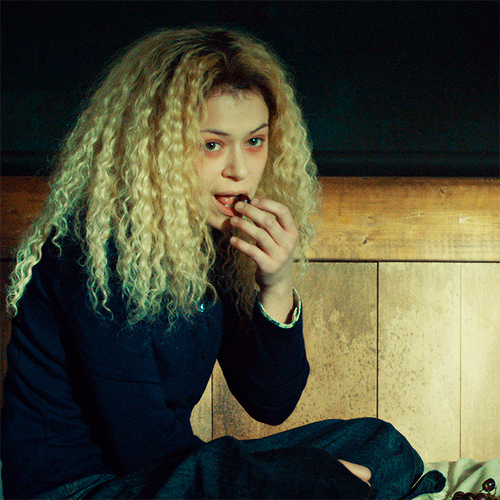
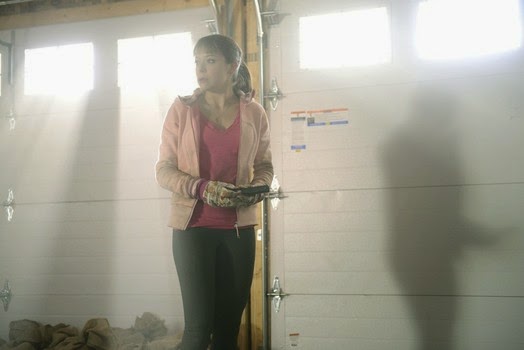

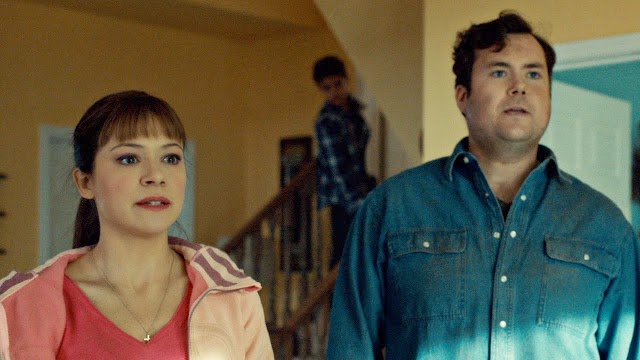

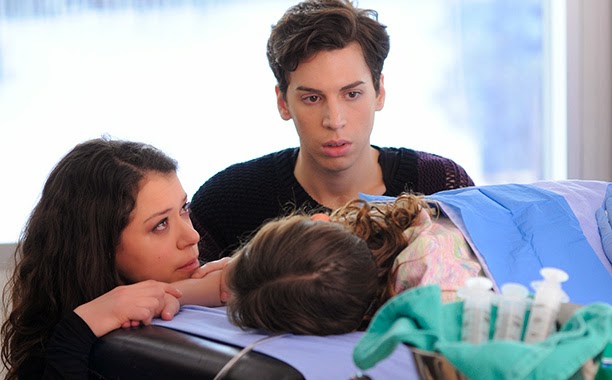


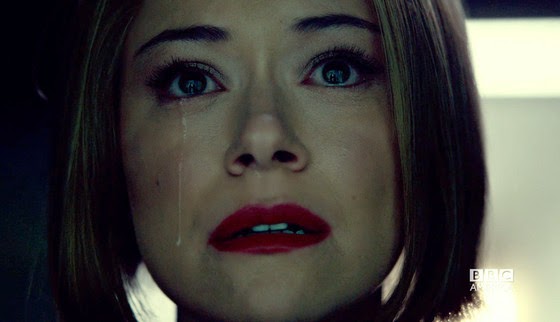
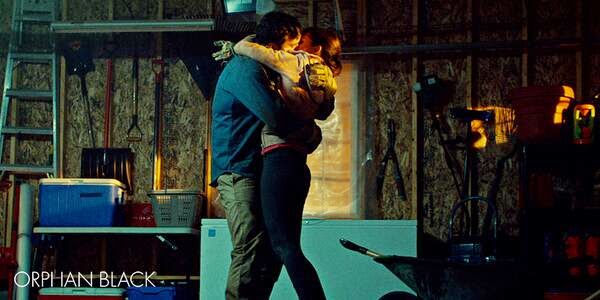
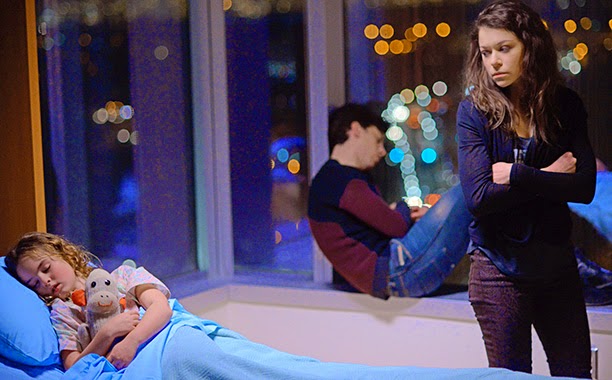
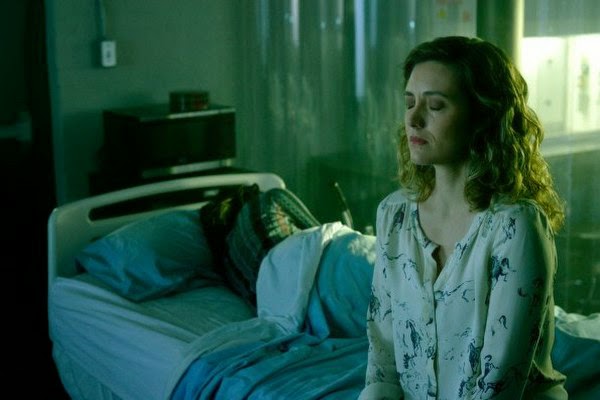
Orphan Black is exception not in spite of the way it focuses on female reproductive issues or bodily consent or medical terminology, but because of all of those things.
ReplyDeleteThere are many shows that depict the pervasive abuse of women (or pervasively depict the abuse of women, which isn't the same thing at all). Fewer of them make it *about* the women concerned, rather than about the abuse (this is a dark world, yo!) or about the abusers (these are bad people, unless Jamie Lannister's doing it, then it's just a bad mood).
Helena, interestingly, is obsessed with the idea of becoming a mother.
What else can she be? Sarah's left her, which must have left Helena feeling like her brief and faltering reconciliation with her twin is nothing but a fantasy. With that, what else can she fall back on but what she's been taught all her life - that her value is in what use the Proletheans can make of her body? And now the use they want is to make "miracle babies." And letting them do it must seem like her last chance at any kind of human connection or love.
Now? Now they’re in it together. They’re a family. And that is perhaps my favorite development on this show.
Going back to my first paragraph, it's what makes Orphan Black even more unique - the value it puts on female relationships as a counterbalance and -action to the abuse of female bodies. How many shows would have made Kira a son? How many would have made Cal (and Cal is a character I largely dislike, but this fault he does *not* have) the reason Sarah can hold herself together through this instead of Cosima and Alison? How many would have made Delphine a guy? Only Felix comes close.
Hell, how many would have made the clones guys?
And, again, a point where the show makes it clear that when men take bodily autonomy from women, it is always wrong. The show doesn’t try to make these men sympathetic, for all that they’re complex (well, Mark is sympathetic, but not Henrik). They are the bad guys.
I've remarked before that Gracie is important in that it removes any way to see this story in terms of abstract bioethics. Gracie's not one of the clones, but is suffering from the same abusive project Henrik is inflicting on Helena - the clones might be the most important women on the show, but the show rages against the abuse of women not of clones.
(And rage it does: I like that it wastes no time on the idea that this might *not* be appalling, or on any "discovery" that it is).
I find it really fascinating how grounded we as the audience are in the clone's view of things. We are never even given the opportunity to side with their enemies, and that's kind of great. This sort of one-sided filmmaking is almost always used wrong, to justify inexcusable behaviors. Here it's being used to show how unjustifiable they are, and that is wonderful.
DeleteRe: Helena, that is a good point I had not thought of. She longs for family and unconditional love, therefore she wants to have children. Good point.
Literally every other show I can think of would have made the clones guys, or at least surrounded them with entirely male characters. Mrs. S would be Mr. S, Delphine would be a dude, Marion would be a dude, everyone would be a dude. So it's clearly an intentional choice to make them all women instead.
I love the addition of Gracie to the storyline, because it gives us the opportunity to see the clones and their struggles from a very nuanced point of view. It also, like you said, removes any opportunity to excuse what the Proletheans are doing, or to call it anything other than abuse.
This sort of one-sided filmmaking is almost always used wrong, to justify inexcusable behaviors.
DeletePaging Jamie Lannister? (Or the "violent criminal we're portraying as an antihero" genre).
And it's not even one-sided in the sense of not giving us the Proletheans' or DYAD's perspectives - we know what they're about, we've even seen them through their own eyes. But the show never lets that obscure how monstrous their actions and agendas are. And never lets itself be about them rather than the clones' lives and struggles.
It also, like you said, removes any opportunity to excuse what the Proletheans are doing, or to call it anything other than abuse.
Or to distance it from the real-world issues.
Word. It never lets it be about the villains. It stays about the clones, and that's what makes this show special.
DeleteKathryn Alexandre ... plays opposite Tatiana Maslany whenever there’s a multiple clones scene. Maslany credits her as the best person to act against, and from what I can tell Alexandre deserves it.
ReplyDeleteMaslany describes Alexandre as the most generous person she's ever worked with. And I find that entirely easy to believe.
The transition here is jarring, going from the virtual screwball comedy that is Donnie and Alison
You've remarked before how much it says about the darkness of this show that Alison's storyline amounts to the comic relief.
Donnie Hendrix takes matters into his own hands and blackmails Angie off the case, proves that she’s using police equipment for a personal vendetta, accuses her of harassment, and settles this once and for all.
One of the things I like about Angela is from her perspective, there's some sort of criminal conspiracy centred on these twins/quints/howeverthefuckmanythereare, that's involved several murders, driven one of her colleagues (who was one of them and maybe involved or maybe a victim) to suicide, and got another colleague or friend suspended. And if she's not supposed to investigate it, that "not supposed" came about through intensely sketchy means. You don't have to change much about the story to make her the hero.
And yet, I also like her role because it shows the regular world still messing with the clones, while leaving their tormentors largely alone. Something we're familiar with from all too many abuse narratives - it hasn't even occurred to Angela that they might be victims rather than instigators - the difference between her and Art.
That she hits both of these notes is some really good writing.
And while praising Tatiana Maslany seems almost redundant sometimes, this episode plus the last and the next really bring home what she's capable of. All five of the main clones are going through emotional wringers and dark nights of the soul. Any one of these performances should amaze, but she's doing five of them, many of which are part of each other too boot. The Emmys have been and gone, and once again she wasn't nominated, and once again she's the one and only case where I call that a complete bloody travesty.
And if you've somehow missed the two stories here, go look. One of them is aww-worthy, the other is positively bawl your eyes out-worthy.
I love the Alison show. I love how insanely dark her storyline is, and also how tragically hilarious. She's probably my favorite character. I mean, I love them all, but Alison. Oh Alison.
DeleteAnd I totally agree about Angela. She's a very complex character. It's easy to hate her, but you're totally right. On any other show, she's the hero. She's even a selfless hero, trying to pursue justice in the face of long odds and against the wishes of her superiors. Heck, there's even a real life conspiracy trying to stop her!
But she can't go after the people really at fault. And I think this totally is an intentional choice. The clones, for all that they are definitely the victims, are relatively powerless, and so they are more likely to be targeted or suspected if something goes wrong. I think it goes back to the themes on power dynamics that run through this whole show.
Tatiana Maslany needs like a "You just ran the acting version of a marathon for two seasons, here is a giant medal and also all of the food and drinks you would ever like" award. Those videos were super cute.
She's probably my favorite character.
DeleteI'm not sure if I could pick just one. But if this was an RPG, my character would probably be Cosima.
I think it goes back to the themes on power dynamics that run through this whole show.
Absolutely. The clones are the easy targets. We don't just see a world full of people who want to hurt and use them, we see a world that makes hurting and using them an easy option.
(Relatedly, I get a somewhat coercive vibe from the affair we briefly saw between Delphine and Leekie. It's not that I think he was, exactly. More that they both knew - especially given the way DYAD works - he was in a position to. But that unlike her, he was in a position not to have to think about that and what it meant. Maybe I'm reading too much into that scene, though).
I'd totally play either Alison or Helena. I love my weirdos. But yeah, I do love absolutely all of them. I guess I just enjoy the chaotic ones, even if I totally am more like Cosima in real life.
DeleteThe power dynamics on this show are pretty much my favorite thing. Next to everything else on the show, of course.
This is literally what Delphine’s entire career has been leading towards. She wants that freaking job.www.123moviestube.io
ReplyDeleteThe information you have posted is very useful. The sites you have referred was good. Thanks for sharing this: learn more here
ReplyDeleteVILLAGE CALL GIRLS
ReplyDeleteVILLAGE CALL GIRL
CALL GIRL
CALL GIRLS
ESCORT
ESCORTS
KOLKATA FEMALE ESCORTS
KOLKATA HOTEL ESCORTS
KOLKATA MODEL ESCORTS
KOLKATA CALL GIRL
KOLKATA CALL GIRL SERVICE
KOLKATA CALL GIRL SERVICE
KOLKATA CALL GIRLS
CALL GIRL
CALL GIRLS
CALL GIRLS SERVICE
CALL GIRL SERVICE
KOLKATA INDEPENDENT CALL GIRLS
KOLKATA INDEPENDENT CALL GIRL
ESCORT
KOLKATA INDEPENDENT MODEL ESCORTS
KOLKATA CALL GIRLS ESCORTS
KOLKATA CHEEP ESCORTS
KOLKATA CALL GIRLS NUMBER ESCORTS
KOLKATA HIGH PROFILE ESCORTS
KOLKATA AIRHOSTESS ESCORTS
KOLKATA PARK HOTEL ESCORTS
KOLKATA PARK HOTEL ESCORT
KOLKATA FIVE STAR ESCORT SERVICE
KOLKATA HOUSEWIFE ESCORT SERVICE